MIKROGEN recomBlot Treponema IgG recomBlot Treponema IgM ...
MIKROGEN recomBlot Treponema IgG recomBlot Treponema IgM ...
MIKROGEN recomBlot Treponema IgG recomBlot Treponema IgM ...
You also want an ePaper? Increase the reach of your titles
YUMPU automatically turns print PDFs into web optimized ePapers that Google loves.
E<br />
Western blot<br />
<strong>Treponema</strong> pallidum<br />
C<br />
<strong>recomBlot</strong> <strong>Treponema</strong> <strong>IgG</strong><br />
<strong>recomBlot</strong> <strong>Treponema</strong> <strong>IgM</strong><br />
Immunoblot test with antigens produced by recombinant techniques for the detection<br />
of <strong>IgG</strong> or <strong>IgM</strong> antibodies against <strong>Treponema</strong> pallidum.<br />
<strong>Treponema</strong> pallidum subsp. pallidum is the causative agent of Syphilis, a chronic disease<br />
occuring only in humans. The disease progresses through stages. After a short<br />
propagation period at the site of infection (primary stage) the hematogenic spreading<br />
of the pathogen throughout the entire organism follows (secondary stage). After the<br />
decline of acute symptoms <strong>Treponema</strong> pallidum can persist for years or lifetime in the<br />
human organism (stage of latency) and then can cause late complications (tertiary<br />
Syphilis). During pregnancy the pathogen can be transmitted to the fetus (Syphilis<br />
connata). In approximately 40 % of the cases infection results in abortion or death of<br />
the child shortly after birth. The propability of infection in utero is around 40-70 %.<br />
The serologic diagnosis of syphilis intends the use of a sensitive antibody screening<br />
assay in the first step (TPHA, ELISA). In the case of equivocal or positive results in the<br />
screening test a confirmation assay is performed in the second step to assure the<br />
specificity (FTA-ABS, immunoblot). Here the immunoblot plays a very important role,<br />
as only with the western blot technique the determination of antibody production against<br />
essential <strong>Treponema</strong> pallidum antigens is possible. At the same time the detection of<br />
different antibody classes is possible. With the use of recombinant antigens the<br />
<strong>recomBlot</strong> <strong>Treponema</strong> <strong>IgG</strong>/<strong>IgM</strong> meets all these requirements perfectly.<br />
<strong>MIKROGEN</strong><br />
molekularbiologische Entwicklungs-GmbH<br />
React. Control<br />
Tp 47<br />
TmpA<br />
Tp 37<br />
Product Advantages<br />
• Recombinant Antigens, therefore<br />
➣ Highest sensitivity and specificity<br />
➣ Simple and clear interpretation due to easy to read bands<br />
➣ Use of pathogen specific <strong>Treponema</strong> antigens Tp 47, Tp17 and Tp 15 as well as TmpA<br />
Easy test procedure; automation possible<br />
Safe evaluation due to kit specific control strip as well as cut-off control<br />
Separate detection of <strong>IgG</strong> and <strong>IgM</strong> antibodies possible<br />
Complement as confirmation tests ideally the recomWell <strong>Treponema</strong> tests (ELISA)<br />
C label: The <strong>recomBlot</strong> <strong>Treponema</strong> tests meet the high standard of the EC directive 98/79/EC on in vitro<br />
diagnostic medical devices<br />
Recombinant Antigens<br />
Recombinant Antigen<br />
F unction<br />
Size<br />
[ kDa]<br />
Tp 47<br />
Membrane protein<br />
47<br />
TmpA Membrane protein<br />
42<br />
Tp 37<br />
Flagellin A<br />
37<br />
Tp 17<br />
Membrane protein<br />
17<br />
Tp 15<br />
Membrane protein<br />
15<br />
Tp 17<br />
Tp 15
Test Principle and Procedure<br />
E E E<br />
Evaluation<br />
Blood<br />
donors<br />
( TPHA<br />
negative)<br />
Potential<br />
cross<br />
reactive<br />
sera<br />
( Borreliosis,<br />
leptospirosis,<br />
auto<br />
immune<br />
dis.<br />
, pregn.<br />
women)<br />
Specificity<br />
<strong>recomBlot</strong> <strong>Treponema</strong><br />
<strong>IgG</strong> <strong>IgM</strong><br />
total n egative<br />
equiv. positive total n egative<br />
equiv. positive<br />
205 202 3 0 205 205 0 0<br />
51 50 1 0 49 47 2 0<br />
C alculation<br />
of<br />
positive<br />
findings<br />
only<br />
1 00<br />
%<br />
100<br />
%<br />
C alculation<br />
of<br />
equivocal<br />
findings<br />
as<br />
positive<br />
9 8,<br />
4 %<br />
99,<br />
2 %<br />
TPHA positive/<br />
<strong>IgG</strong><br />
FTA-ABS<br />
positive<br />
84 0 3 81<br />
<strong>recomBlot</strong> <strong>Treponema</strong><br />
<strong>IgG</strong> <strong>IgM</strong><br />
total n egative<br />
equiv. positive total n egative<br />
equiv. positive<br />
Positive for<br />
<strong>IgM</strong><br />
antibodies<br />
( 19S-<strong>IgM</strong>-FTA)<br />
46 0 7 39<br />
Sensitivity<br />
1 st. Incubation: A test strip loaded with <strong>Treponema</strong> antigens is incubated with<br />
diluted serum or plasma in a dish for 1 h.<br />
Wash 3 times<br />
2 nd. Incubation: Peroxidase conjugated anti-human antibodies (<strong>IgG</strong> or <strong>IgM</strong> specific)<br />
are added. Incubate for 45 min.<br />
Wash 3 times<br />
3 rd. Incubation: 5 - 10 minutes after addition of the coloring solution, insoluble<br />
colored bands develop at the sites on the test strips occupied by<br />
antibodies.<br />
In collaboration with an european expert for <strong>Treponema</strong> pallidum, Prof. Dr. H.-J. Hagedorn, more than 300 serum probes<br />
with defined TPHA status were analysed with <strong>recomBlot</strong> <strong>Treponema</strong> <strong>IgG</strong>/<strong>IgM</strong>. TPHA negative serum probes were used<br />
for calculation of specificity and TPHA and <strong>IgG</strong> FTA-ABS positive serum probes were used for calculation of sensitivity.<br />
C alculation<br />
of<br />
positive<br />
findings<br />
only<br />
9 6,<br />
4 %<br />
84,<br />
8 %<br />
C alculation<br />
of<br />
equivocal<br />
findings<br />
as<br />
positive<br />
1 00<br />
%<br />
100<br />
%<br />
Storage and Shelf Life At 4 °C 18 months from the time of production<br />
Commercial Product Article No. 5102 <strong>recomBlot</strong> <strong>Treponema</strong> <strong>IgG</strong><br />
Reagents for 20 determinations<br />
Article No. 5103 <strong>recomBlot</strong> <strong>Treponema</strong> <strong>IgM</strong><br />
Reagents for 20 determinations<br />
<strong>MIKROGEN</strong> GmbH<br />
Floriansbogen 2-4 · D-82061 Neuried · Germany · Tel.: +49 (0)89 54801-0 · Fax: +49 (0)89 54801-100<br />
Internet: www.mikrogen.de · eMail: mikrogen@mikrogen.de<br />
pirbtpe005a


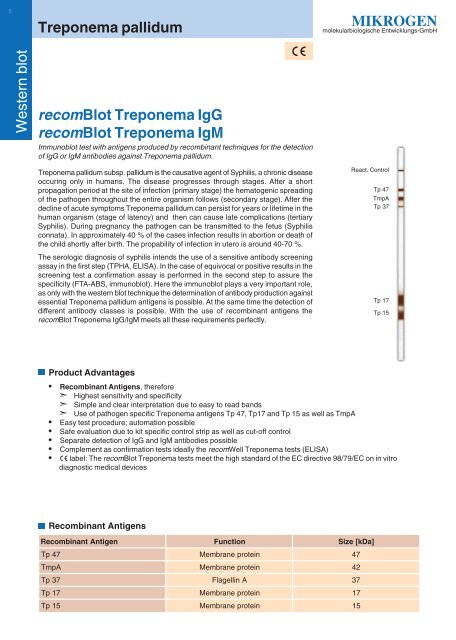
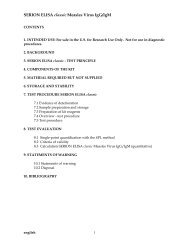
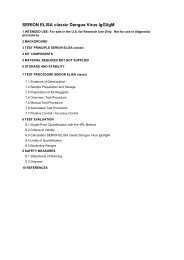
![MIKROGEN recomBlot CMV IgG [Avidity] recomBlot CMV IgM ...](https://img.yumpu.com/47840028/1/185x260/mikrogen-recomblot-cmv-igg-avidity-recomblot-cmv-igm-.jpg?quality=85)
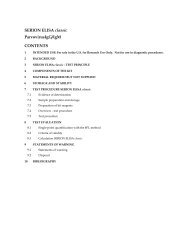
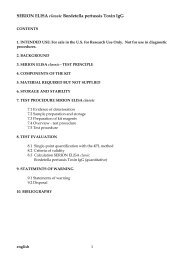
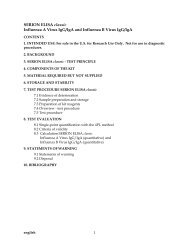
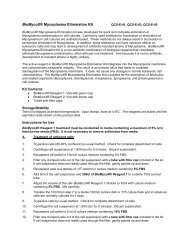
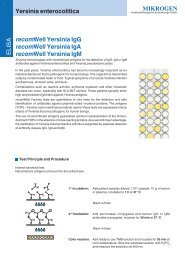
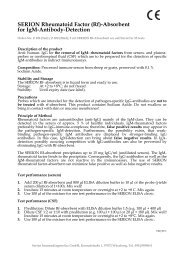
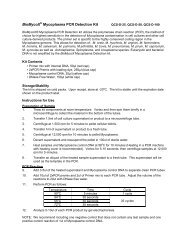
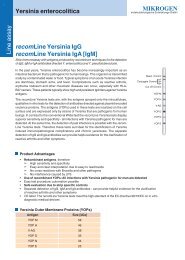
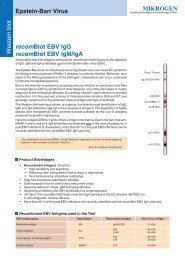
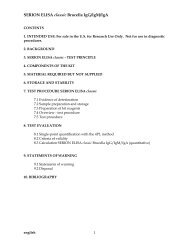
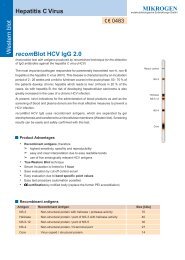
![MIKROGEN recomLine Parvovirus B19 IgG [Avidity] recomLine ...](https://img.yumpu.com/31102785/1/185x260/mikrogen-recomline-parvovirus-b19-igg-avidity-recomline-.jpg?quality=85)